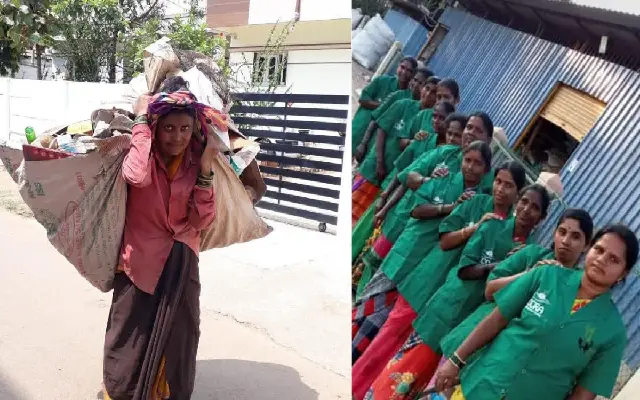In Davanagere, Karnataka, a transformative initiative led by the Davanagere Municipal Corporation and supported by the NGO Green Dal has transformed the lives of women rag pickers, empowering them to become entrepreneurs through dry waste collection centres. This has not only provided a sustainable livelihood but also instilled dignity and self-worth in these previously marginalised women.
advertisement

The plight of female rag pickers
Before the intervention of the Green Dal and the city authorities, the women rag pickers of Davanagere lived on the margins of society, scavenging at garbage dumps for recyclable materials to eke out a living. Many faced harsh conditions and social stigma associated with their work, struggling to earn a meager income. Their daily lives revolved around waiting for the garbage trucks at the dumps and rushing to collect recyclable materials like plastic bottles, bags and coconut shells.
Intervention by the “Green Dal” and the Davanagere Municipal Corporation
Recognizing the plight of these women, Green Dal, a committed NGO working for the welfare of rag pickers, stepped in to bring about a major change. They identified 1,053 rag pickers across Davanagere, including 39 women who were particularly struggling at the Avalagora village dumping site. Backed by a Supreme Court order recognizing dry waste as belonging to rag pickers, Green Dal approached the Corporation Commissioner to set up a dry waste collection centre under the Corporation’s jurisdiction.
Establishment of dry waste collection centres
Responding to the initiative proposed by the ‘Green Dal’, the Davanagere Municipal Corporation approved setting up of six dry waste collection centres at strategic locations including the township, MCC A Block Supermarket, Narahari Sheth in Vinovanagar, District Stadium premises and Bhagirath Circle in Davanagere Municipality. These centres became operational hubs where rag pickers, mostly women, could collect and sort the dry waste collected from households and public spaces.
Training and Empowerment
To equip these women with the necessary skills for waste management and entrepreneurship, “Green Dal” conducted comprehensive training sessions. They were taught how to effectively collect, segregate and manage dry waste, including differentiating between recyclable materials. Each woman was assigned the responsibility of managing one of the six dry waste collection units. This responsibility included visiting households in a garbage truck, collecting dry waste and taking it to designated centers for segregation.
Impact and Change
The impact of this initiative is immense. Once marginalized women rag pickers are now entrepreneurs and earn a respectable income of Rs 15,000 to Rs 20,000 per month. This income not only helps them support their families but also allows them to live a dignified life and provide a better education for their children. Geeta, one of the grateful beneficiaries, expressed, “It was difficult to survive as rag pickers. Green Dal has changed our lives by making us entrepreneurs. Now we are earning a decent income and leading a happy life.”
Sustainable Development and Social Change
Beyond economic empowerment, the initiative has also contributed to sustainable development by promoting effective waste management practices in Davanagere. By including rag pickers in the formal waste management sector, the city has improved cleanliness and reduced environmental pollution. Additionally, the initiative has promoted social inclusion by empowering marginalized women and integrating them into the mainstream economy.
Future outlook
Similar efforts should now be expanded across Karnataka and beyond so that more rag pickers, especially women, can benefit from such transformative programs. Supportive policies and continued collaboration between NGOs, local governments and communities will be crucial to sustaining these efforts and achieving broader social impact.
Conclusion
The journey of Davanagere’s women rag pickers from rag pickers to entrepreneurs demonstrates the power of community-led initiative and collaboration. Through empowerment, training and support, these women have not only improved their economic situation, but also regained their dignity and respect in society. The success of the dry waste collection centre highlights the potential for inclusive development, where no one is left behind.

